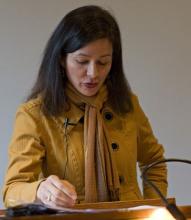Ken doesn’t think that philosophy is the most conducive setting for philosophy; John agrees that that’s the case, at least in the U.S., where prisons are like overcrowded warehouses that are excessively focused on punishment. But that’s not the case everywhere – prisons in Norway, for instance, demonstrate that prisons don’t have to be so bleak. They can be places for rehabilitation. It doesn’t have to be a dichotomy of rehabilitation and punishment: losing freedom and being confined are already punishment enough, Scandinavian prisons hold. There’s no need to heap on insults to inmates’ dignity on a daily basis. Okay, says, Ken, but if you’re going to teach inmates anything, why should it be philosophy? Shouldn’t it be something more job-oriented? And what about the money that goes into prison education – shouldn’t that money be going to the education of non-inmates? John disagrees – he argues that we can educate both the free and the incarcerated.
John and Ken welcome guest Jennifer Lackey, Professor of Philosophy at Northwestern University. John asks Jennifer why she decided to teach inmates in prison in the first place. Jennifer explains that she’s had an interest in the prison population since she was 12 years old. At some level, we all bear responsibility for incarceration. John asks Jennifer about what it’s like to teach at a maximum security men’s prison – both for her, as a teacher, and for the students themselves. Jennifer explains that most of her students have been convicted of at least one murder and most have at least 25 years left on their sentence. There are constant challenges with security (though she’s never been afraid for her own safety, expect for a few tense situations) and with bringing course materials. Ken asks her whether the students see this as an hour-long escape from their regular prison routine or whether they’re actually invested in the learnings. Jennifer explains that in her 16 years of teaching, she’s rarely come across more engaged, more passionate, and committed students than her students at Stateville.
Ken asks Jennifer to explain how she approaches teaching in prison. Is it any different than with her non-incarcerated students? She explains that there are differences in the level of preparedness – some of her incarcerated students didn’t know how to read when they got to the prison. But, Jennifer explains, she teaches both of her sets of students with the same content and expectations. Some of her students at Stateville struggle, and there are one-off issues that come up – like, say, the prison being on lockdown for a month. So why do the students at Stateville care, asks John? Jennifer explains that most of her students have grown up in prison – the crimes they’re in prison for were committed years, if not decades, ago. They want to improve themselves, they want their children to value education and see that their fathers are capable of growing by learning, they want to feel that they have a second chance at life…a variety of reasons serve as motivations. The three talk in more depth about the profound search for meaning that prisoners – even those on death row – can complement with studying philosophy.
John then brings up a common concern: we have a finite amount of resources, so why should we spend them on prison education when we could be using those resources to prevent the crimes that lead people to prison in the first place? Jennifer, John, and Ken discuss this topic in greater depth, then welcome questions from the audience. They continue the discussion by tackling questions about the views of people who work in prisons on prisoner education, what education can do for prisoners, and whether we can muster the political will to change our system of incarceration.
Roving Philosophical Report (Seek to 5:47): Shuka Kalantari explores the workings of a philosophy in prison program in Kansas by talking to the first transgender woman in Kansas to transition while being incarcerated.
60-Second Philosopher (Seek to 45:10): Ian Shoales talks about prisoners who write while imprisoned and people who became famous in great part due to their time behind bars.




Comments (3)
Harold G. Neuman
Tuesday, August 20, 2019 -- 7:46 AM
I have heard and read storiesI have heard and read stories about the mental health and development of those incarcerated. Most of us have. An obvious observation says they have a lot of time on their hands and limited resources/opportunities to creatively employ it. There have been notable reversals of attitude and behavior among some men and women who achieve parole and/or exoneration, some of those going on to bigger and better things. Rehabilitation is a stated goal for convicts and is a wonderful thing when it happens, whether or not anyone believes they have paid their debt to society. Philosophy, like religion, can change lives, if and only if the light bulb wishes to change. With commitment, many things are possible. But, in the final analysis, only the inmate can know himself and what, if any, his future plans may be. Any predictions as to failure or success. based upon psychological profiling may be helpful, or, they may only represent a shot at a dartboard.
Cloudsicker
Saturday, March 2, 2024 -- 8:52 AM
Exciting news in the world ofExciting news in the world of online casinos! There's a new payment method making waves at Australia online casinos - pay by phone. Say goodbye to lengthy bank or credit card forms and hello to convenience. To explore which casinos support this feature and to learn more, visit wild card city casino login . Everything you need to know is neatly laid out there.
heyduggeek
Tuesday, March 5, 2024 -- 5:47 PM
I really like the communityI really like the community system in Drift Boss. People are very friendly and willing to share experiences with each other.